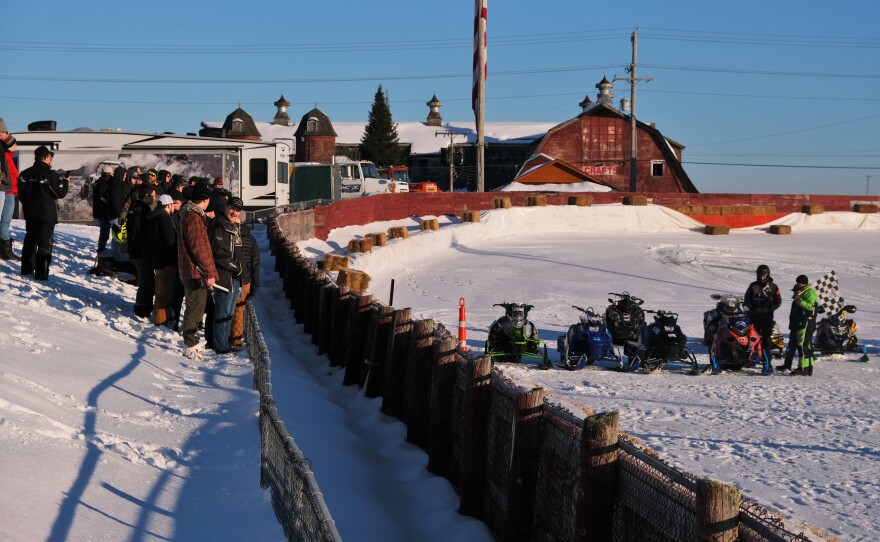On a clear, sunny morning with the temperature hovering around 20 degrees students from 13 different universities made their way onto the Eagle River Snowmobile Championships Derby Track.
Fifteen snowmobiles left on the track overnight are uncovered for their first challenge of the morning: the cold start.
“These student competitors have an OEM [original equipment manufacturer] snowmobile that they’ve modified to make cleaner, quieter, and more fuel efficient. One of the major changes is understanding cold start performance. They had modifications, maybe a new muffler, a new engine calibration. They want to make sure they can still start in cold weather which is the intended zone for most snowmobiles,” said Zach Lipple, the Rules Chair for the SAE Clean Snowmobile Challenge.
Lipple stands a dozen or so yards down the derby track from where the snowmobiles are lined up waiting to see how each sled will perform in this challenge.
A whipping of a checkered flag starts the clock.
Students with a spark ignition snowmobile need to complete the event in less than 45 seconds for full points and less than two minutes for partial points.
“The diesels, since they have a much harder time with colder weather, have up to a minute for full points and up to four minutes for partial points,” explained Lipple.
Sophie Bollin is a third-year mechanical engineering student at Michigan Tech University.
She watched from the sidelines as both of the sleds her team of 30 students have worked on for the last year get their turns.
“We honestly had some battery issues with our Viper. We had no idea if it was going to even start. It got that first crank and turned over. Our team was just like, ‘Holy cow.’ Didn’t start running right away, but it did start which is a big step for us. Our diesel even took a long time to crank, but eventually got hot enough, turned over. It’s a lot of anticipation but as soon as that first crank goes our team is just excited to see what else we can do,” said Bollin.
Michigan Tech wasn’t alone in celebrating the cold starts. All but one sled was able to complete the task, a rarity according to Lipple.
“A lot of teams did really well this year. Only one team in the gasoline category wasn’t able to start. All other teams were able to complete in appropriate time. All the diesels were able to cross the line which is a first for the competition,” said Lipple.
The SAE Clean Snowmobile Challenge started in the late 90s in Jackson Hole, Wyoming in an effort to address environmental concerns of snowmobile use in the Yellowstone area.
It’s now become a yearly competition to push innovation in students while they try to create cleaner, quieter, and more fuel-efficient sleds while making sure they’re still fun to ride.
“There’s a lot of different challenges that Clean Snow provides our teams. I think that’s what’s best is that your given this base model and you have a lot of room for creativity and go from there. It’s all up to the teams what they want to do. There’s a lot of room for different ideas which is great,” said Bolling.
SAE says they’ve seen the impact of innovation over the years leading to things like snowmobiles with greater fuel economy and tightening of emissions targets.
Another aspect to come out of this competition is the soft skills the students learn working together.
“The students learn team management and project management which don’t really get taught that much in the curriculum, but the key to success is having a good plan and sticking to it and having everyone buy into the plan. That’s the other aspect they do with these,” said Glenn Bower, the automotive faculty advisor at the University of Wisconsin-Madison.
While those skills might not be taught in the curriculum, they’re definitely skills future employers look for.
Caitlyn Rzasa is one of those employers. She’s in human resources with MacLean-Fogg, a company that makes fasteners and other parts often found in snowmobiles and other machinery.
“Part of our support here at the snowmobile competition is to make sure that we are encouraging and promoting the next generation of engineers that will hopefully come work in our company, they’ll go work for our customers specifically, but we want to make sure that they know who we are and what we do,” said Rzasa.
She says the team-building skills the students are learning through this challenge is one of the most important skills.
“They have to work with a lot of different personalities. They’ve got budgets, they’ve got time constraints. All of which are real world things that they’re going to have to deal with as soon as they’re in this profession,” Rzasa said.
It’s the skills and innovation that students like Bollin are looking forward to bringing to the industry.
“I went to college looking to go automotive, but now that I’ve been at school and I’ve been part of Clean Snow I’m looking at working with ideally snowmobiles or heavy equipment,” said Bollin.
The Clean Snowmobile Challenge ran Tuesday through Thursday at the Eagle River Snowmobile Championship Derby Track. The snowmobiles were put through various skills and emissions tests.
This is the second year the event has been held in Eagle River.








